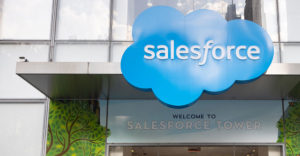This could end badly — or not.
Activist investors Elliott Management Corp., Inclusive Capital, and Starboard Value LP have all taken significant positions in Salesforce, and the scuttlebutt is that they want board seats. Salesforce is a target of those companies because they believe they can make the company more profitable and make themselves significant profits. The question is how much they want to do.
There’s nothing wrong with this. It’s capitalism, pure and simple, driven by the notion that a corporation exists to generate wealth for the shareholders, full stop.
Under the longtime leadership of Marc Benioff, Salesforce has attended to shareholder interests as well as those of other stakeholders such as customers, partners, and employees.
The brewing confrontation between the company and the activist shareholders pits two different cultures against each other. The activists can trace their origins at least to Milton Friedman, while the advocates of a broader stakeholder definition go even further back.
Related: How Oracle Stays a Step Ahead of Activist Investors
The concern is that activists frequently, but not always, strip a company of its equity, load it with debt, and cast it off, a quivering hulk of a once dynamic company. It’s too early to say this fate awaits Salesforce, and it’s important to see the process work out because there is some truth in the need for improvement.
Divestitures on the Horizon?
Specifically, Salesforce’s profitability is ok but not great, and the company has lost nearly half its value in the last couple of years. Salesforce has also bought a raft of other companies, such as MuleSoft, Cliq, Tableau, and Slack, often paying premiums on the open market. You can see a full list of Salesforce’s acquisitions here.
The activists think that maybe the company would be better off if it stuck to its knitting and possibly if it sold off some of its units. That’s a tough call, especially since Salesforce has, over time, incorporated those acquisitions into its offering and made a case for business processes that work in tandem with them.
Could Salesforce do some rearranging and make itself more profitable? Absolutely, and the press is full of ideas about how. For example, some say that the company could rationalize some of its senior-level compensation packages to be more results-driven. Maybe it could sell off bits but not next week. It’s a buyers’ market out there, so it’s not a good time to be selling. That’s doubly true if the activists make negative public statements about the value of any of those components.
Certainly, Salesforce could take a holiday from acquisitions and perhaps focus more on future business processes that would use all the technology they already have.
Big Ships Turn Slowly
The work-from-anywhere mantra of the pandemic era appears to be coming into direct apposition with the activists. There are rumblings about going back to work so that employees once again occupy the expensive real estate the company is occupying in many cities but not using optimally.
Also, don’t forget that we’re talking about a $30 billion company. Moving the needle in a more profitable direction might take time and a bit more than a few million bucks in bottom-line improvements.
It seems to me that the activists are trying to provide a catalyst to change Salesforce from a growth company to more of a mature business that still rocks growth but with an eye toward growing profits too. Nothing wrong with that, but the devil is in the details.
Do the activists push so far in the direction of profits that the essence of Salesforce, the thing that makes it something of a trailblazer cult, goes away? Or can they achieve a nirvana situation like Apple has in becoming one of the most valuable companies in the world while still retaining a loyal customer base and still offering killer products?
Quick aside here, it’s been years since Apple introduced a game-changing product though Apple silicon can undoubtedly turn heads. But Apple silicon still inhabits the same boxes that older silicon did, and that’s kind of what happens when a category matures, as I tried to point out last time.
Maybe that’s where the software/CRM industry is today. Over the last 20-plus years, we’ve significantly reduced the cost of software while packing unheard-of value into the same space. That’s commoditization, and it goes with serving bigger markets, keeping prices sharp, and tracking profitability everywhere.
My Two Bits
Between now and March, you can expect the parties to recruit slates of board members for shareholders to vote on during the annual shareholder meeting. You can also expect to hear many monologues about how to improve the company’s bottom line.
It’s unlikely, but for all parties concerned, and to enable the best possible outcome, I think it would be wise for everyone to embargo further announcements. It’s time to play inside baseball and to negotiate in private.
























































